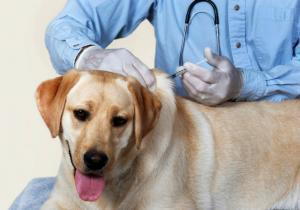Rabies Shots: Why do some places charge such different fees for the “same” service?
- posted: Nov. 07, 2017
Rabies Shots: Why do some places charge such different fees for the “same” service?
By Jim Young – Manager, Bellalago Veterinary Hospital
“Why is [fill-in-the-name of a service] cost that here and cost this down the street?” I addressed this question in regards to spays and neuters before. You can read my answer here. In that article I discussed the concept of a “fungible” item or service. These sorts of things are interchangeable such as a gallon of milk, soup, paper towels, etc. I understand that there may be certain attributes or brands that result in someone buying one over another, but most of the time we make our choice based on price. I know if my car needs gas, I will go to the gas station with the cheapest gas. However, many services and items in the veterinary world are not fungible. While it may be the same title or named the same, what you’re getting is completely different! This more akin to buying a car. While you may be able to get a four-door sedan from Kia and Mercedes, you’re going to find both vehicles are very different. Veterinary medicine is often this way too. You get what you pay for!
I want to feature different services so that owners can educate themselves about what is important, and ask the right questions. I know I did not know about these differences before I started working in the field.
 In this second installment, I want to explore why the prices of rabies shots seem so different between different clinics and hospitals. Once you know this, you will know what sorts of questions to ask and why these differences are so important. It is also important to note that while I’m focusing on rabies shots, what I’m saying it also applicable to other vaccines as well. I’m focusing on the rabies shot to simplify things and because every pet needs one.
In this second installment, I want to explore why the prices of rabies shots seem so different between different clinics and hospitals. Once you know this, you will know what sorts of questions to ask and why these differences are so important. It is also important to note that while I’m focusing on rabies shots, what I’m saying it also applicable to other vaccines as well. I’m focusing on the rabies shot to simplify things and because every pet needs one.
First, let me get this out of the way, I am not implying that other clinics and hospitals provide sub-standard care. Every clinic and hospital provides a different standard of care in order to meet the different needs found within the community. What is really at stake is what is right for your pet, for you, and for your pocketbook. There is always risk involved in all medical procedures and even the most advanced hospitals with the most skilled staff experience complications. Spending more money may help lower the risk, but no amount of money will completely eliminate it!
Many of the low-cost clinics pick a rabies vaccine based on cost rather than reaction rate. I’ve been at the meetings between Dr. Young and medical representatives. Cost is usually one of the last things asked (and I usually do it. If you read the previous post, then you know I’m very “thrifty.”). Simply put, safety is the number one concern when we pick vaccines. Often times this means we’re not buying the cheapest vaccines on the market. Low-cost clinics often look only at the bottom line and pick a vaccine based on what best keeps their prices low. It should be noted that vaccines are generally very safe for most pets. However, if your pet is one of the unlucky ones to have reactions, then having a better vaccine lessens those risks and can result in less-intense reactions. If you want a vaccine that’s the safest possible for your pet, then the price goes up.
Many of the low-cost clinics do not value your time. It is common to read about people who have waited in long line in a parking lot for hours to save $8 on a shot. I’ve been to some of the local low-cost clinics and witnessed firsthand where people with an appointment wait 2-3 hours anyways. One of the local ones reportedly schedules 16 appointments every hour. That’s less than 4 minutes per appointment! There is little that can be accomplished in that short of a time without putting every other appointment behind. I won’t say that we’re always on time. Usually we’re running behind because of an emergency (see “What happens when I come in for an Emergency”) and we do our best to minimize your wait or reschedule your appointment. We do this because we know your time is valuable. We aren’t going to pack up and move to another parking lot so we have the ability to reschedule. Additionally, we schedule appointments in such a way to build in time in case of emergencies. We try to do everything we can to ensure that we see you when we say we will. If you want all of this in place to help safeguard your time, then the price goes up.
Many of the low-cost clinics do not do a full, comprehensive exam before giving the rabies shot. Vaccines are generally very safe, but there are some factors that increase the risk of reactions. Without a full, comprehensive exam before receiving the shot, one cannot know if the pet is healthy enough. An exam takes time, uses equipment, and requires training. Low-cost clinics cannot spend these resources without raising their prices. Therefore, many low-cost clinics provide a very basic exam, if they provide one at all! Some will surprise you by telling you that a rabies shot costs one amount but then charging extra for the exam. We will not do vaccines here without also performing a full, comprehensive exam. It isn’t safe for your pet. Our shot packages all include a full, comprehensive nose-to-tail exam. While you can get the shots “a la carte,” you still have to pay for the exam too. (A wellness exam is only $37.50 when this was written). If you want an exam to better ensure the safety of your pet during the vaccines, then the price goes up.
 A few of the low-cost clinics do not even have a doctor give the rabies vaccine. I don’t want to mention names, but we called one of the local shot clinics recently during a staff training on phone etiquette and asked about the rabies vaccines. They advertise very inexpensive rabies vaccines so I figured I’d ask a few questions about it. While I had their staff member on speakerphone, she explained how they do the shots. I asked who the doctor would be doing the shots and was told “that anyone can do it” and no doctor would see my pet. Unfortunately, this is not only dangerous, but it isn’t legal. Florida’s Statutes require a licensed veterinarian give the shot. If anyone else does it, then the pet isn’t legally vaccinated! [Let me note here that not having a veterinarian do this is not a common practice, but some unscrupulous clinics do it putting your pet at risk and wasting your money.] If you want your pet legally vaccinated by a licensed veterinarian, then the price goes up.
A few of the low-cost clinics do not even have a doctor give the rabies vaccine. I don’t want to mention names, but we called one of the local shot clinics recently during a staff training on phone etiquette and asked about the rabies vaccines. They advertise very inexpensive rabies vaccines so I figured I’d ask a few questions about it. While I had their staff member on speakerphone, she explained how they do the shots. I asked who the doctor would be doing the shots and was told “that anyone can do it” and no doctor would see my pet. Unfortunately, this is not only dangerous, but it isn’t legal. Florida’s Statutes require a licensed veterinarian give the shot. If anyone else does it, then the pet isn’t legally vaccinated! [Let me note here that not having a veterinarian do this is not a common practice, but some unscrupulous clinics do it putting your pet at risk and wasting your money.] If you want your pet legally vaccinated by a licensed veterinarian, then the price goes up.
Many of the low-cost clinics do not maintain a safe level of cleanliness to prevent the spread of disease. Shots down under a tent in a parking lot or on a folding table in a hallway cannot have the same level of cleanliness found in a hospital setting. When animals are placed on the same surface just a few minutes apart, how can that surface be cleaned appropriately? Diseases like the canine flu virus can be spread very easily. If the animals are not being examined appropriately and cleanliness is not being maintained, every animal that follows an ill one could be at risk for catching the disease! We clean between every patient using hospital-grade cleaners. Towels are switched and laundered after every patient. While this still may not prevent all diseases from spreading, we do our best to maintain the highest level of cleanliness. We also have written policies for handling infectious diseases should one be identified (again, how does one identify one without a proper exam?). If you want hospital levels of cleanliness, then the price goes up.
Many of the low-cost clinics do not have training to deal with reactions. Let’s face it. Low-cost shot clinics aren’t interested in anything but the shots. Even if you’re one of the first pets to get vaccinated that day, those that are in parking lots won’t still be around by the time there is a reaction. Why train the staff for something that the whole business model is built around avoiding? We’re fully trained to deal with reactions and keep everything on hand to address them. If you want your veterinarian to be ready if your pet has a reaction, then the price goes up.
 Many of the low-cost clinics cannot be found if records are needed in the future. While I’d love to think I’m a pretty responsible person, I’ll admit I lose things. Sometimes important things. I’m sure I’m not alone in this. What if you lose the sheet of paper the low-cost clinic gives you recording the shots? What about if that paper gets destroyed? Will you remember the veterinarian’s name? Do they have their number listed in the Yellow Pages? Do they have someone to answer their phone if you call or do you have to leave a message and hope someone calls back? Is the one advertising at CVS down the street the same one that was at the AutoZone a few months ago? You can’t just go back to the parking lot and hope they’re there! We’re not going anywhere. We have electronic records and can print rabies certificates and other records showing your pet is protected and you’re legal quickly. We can even fax or email them if needed. This is especially important if you’re traveling or taking your pet to the boarders or groomers. If you want to know where your records are just in case and have easy access to them, then the price goes up.
Many of the low-cost clinics cannot be found if records are needed in the future. While I’d love to think I’m a pretty responsible person, I’ll admit I lose things. Sometimes important things. I’m sure I’m not alone in this. What if you lose the sheet of paper the low-cost clinic gives you recording the shots? What about if that paper gets destroyed? Will you remember the veterinarian’s name? Do they have their number listed in the Yellow Pages? Do they have someone to answer their phone if you call or do you have to leave a message and hope someone calls back? Is the one advertising at CVS down the street the same one that was at the AutoZone a few months ago? You can’t just go back to the parking lot and hope they’re there! We’re not going anywhere. We have electronic records and can print rabies certificates and other records showing your pet is protected and you’re legal quickly. We can even fax or email them if needed. This is especially important if you’re traveling or taking your pet to the boarders or groomers. If you want to know where your records are just in case and have easy access to them, then the price goes up.
Many low-cost clinics save money by only keeping the absolutely-required equipment on hand. Even if there is a veterinarian performing an exam and giving the shot, how does the vet test for disease? The low-cost clinic vet might not have access to many of the expensive pieces of equipment. Low-cost clinics do not have $40,000 blood machines, a supply of tests looking for common illnesses, or any other equipment that requires lots of money and or space. For parking-lot shot clinics, where would they put this stuff? Most of it is very temperature sensitive. How would they keep it at the proper temperature? Low-cost clinics do not have this stuff because it doesn’t meet their business goals. Not to mention, what if there is a reaction to the vaccines? Without proper equipment on hand, what can they do? Little. We have a full pharmacy and laboratory set up in our hospital which is fully stocked and can address many different situations and run all sorts of different tests. For instance, if your dog has parvo, we can determine that in just a few minutes. Or, if your cat isn’t acting right, we can run blood tests and find out why. In the rare situation where there is a reaction with our vaccines, we also have the medications and equipment necessary to address this situation. If you want the proper equipment on hand to help ensure your pet’s safety, then the price goes up.
Many of the low-cost clinics save money by keeping a minimum of staff on hand. Anything that increases overhead for a low-cost clinic is to be avoided at all costs. People are some of the most expensive parts of veterinary medicine. It is not uncommon for a low-cost clinic to be staffed at a bare-bones level. This can cause medical issues if pets cannot be held appropriately. This is especially true for bigger animals. This results in owners and staff being bitten and pets getting hurt. We always keep our staffing consistent. While our staff does get sick and emergencies happen, we have enough staff on hand to handle anything that comes in. If you want to have enough hands to get the shots done safely, then the price goes up.
As you can see, rabies shots are not fungible services. Different clinics and hospitals offer very different versions of the same service. While the low-cost options might be fine for many animals, they aren’t what most people think of when they think of what they want for their fur babies. Of course, some times the cost of a service is the most important factor and low-cost is the way to go. Finally, don’t forget that just because a veterinary clinic or hospital is more expensive, that doesn’t mean they offer anything more than anyone else!
Owners need to educate themselves and ask the right questions! What is the reaction rate to the vaccine? Is a full, comprehensive exam included? Where can I get copies of my medical records in the future? If there is a reaction, where do I go? Who will be giving the shot? Who holds my pet while the shot is being given? What steps are taken to prevent the spread of disease? In the end, pricing around services such as rabies shots is kind of like trying to price around that four-door sedan. You’re going to get a different price from the Mercedes dealer than the used car lot down the street; however, there will be a big difference in what you get!
Location
Find us on the map
Bellalago Veterinary Hospital
3809 Pleasant Hill Rd
Kissimmee, FL 34746, US

